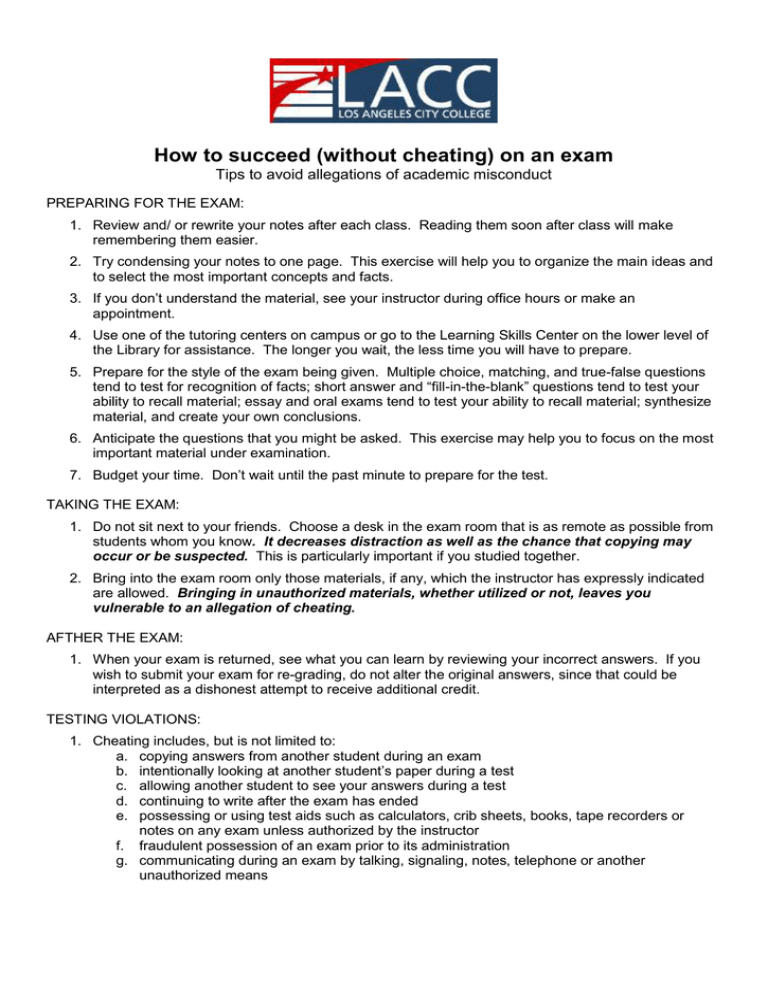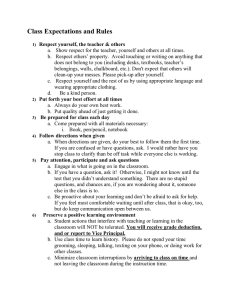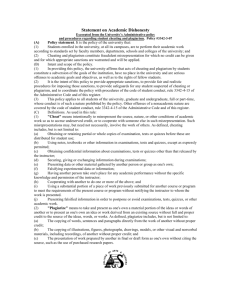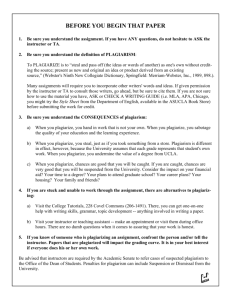Cheating and Plagiarism Handout (new window)
advertisement

How to succeed (without cheating) on an exam Tips to avoid allegations of academic misconduct PREPARING FOR THE EXAM: 1. Review and/ or rewrite your notes after each class. Reading them soon after class will make remembering them easier. 2. Try condensing your notes to one page. This exercise will help you to organize the main ideas and to select the most important concepts and facts. 3. If you don’t understand the material, see your instructor during office hours or make an appointment. 4. Use one of the tutoring centers on campus or go to the Learning Skills Center on the lower level of the Library for assistance. The longer you wait, the less time you will have to prepare. 5. Prepare for the style of the exam being given. Multiple choice, matching, and true-false questions tend to test for recognition of facts; short answer and “fill-in-the-blank” questions tend to test your ability to recall material; essay and oral exams tend to test your ability to recall material; synthesize material, and create your own conclusions. 6. Anticipate the questions that you might be asked. This exercise may help you to focus on the most important material under examination. 7. Budget your time. Don’t wait until the past minute to prepare for the test. TAKING THE EXAM: 1. Do not sit next to your friends. Choose a desk in the exam room that is as remote as possible from students whom you know. It decreases distraction as well as the chance that copying may occur or be suspected. This is particularly important if you studied together. 2. Bring into the exam room only those materials, if any, which the instructor has expressly indicated are allowed. Bringing in unauthorized materials, whether utilized or not, leaves you vulnerable to an allegation of cheating. AFTHER THE EXAM: 1. When your exam is returned, see what you can learn by reviewing your incorrect answers. If you wish to submit your exam for re-grading, do not alter the original answers, since that could be interpreted as a dishonest attempt to receive additional credit. TESTING VIOLATIONS: 1. Cheating includes, but is not limited to: a. copying answers from another student during an exam b. intentionally looking at another student’s paper during a test c. allowing another student to see your answers during a test d. continuing to write after the exam has ended e. possessing or using test aids such as calculators, crib sheets, books, tape recorders or notes on any exam unless authorized by the instructor f. fraudulent possession of an exam prior to its administration g. communicating during an exam by talking, signaling, notes, telephone or another unauthorized means Writing a paper (honestly) Tips to avoid allegations of academic misconduct 1. Be sure you understand the assignment. If you have ANY questions, do not hesitate to ASK the instructor. 2. Be sure you understand the definition of PLAGIARISM: To PLAGIARIZE is to use another’s ideas or words as if they were your own. That would include purchasing or otherwise obtaining a part or all of another person’s work which you then represent as your own original work, including commercial term papers, from friends, family or the internet. Most of the time, you have to incorporate other writers’ words and ideas in an assignment. If given permission to consult those writers, go ahead, but be sure to cite them. If you are not sure how to use the material you have without plagiarizing, ASK or CHECK A WRITING GUIDE before submitting the work for credit. 3. Be sure you understand the CONSEQUENCES of plagiarism: a. When you plagiarize, you hand in work that is not your own for critical review. You do not learn anything because your work is not being reviewed. When you plagiarize, you sabotage the quality of your education. b. When you plagiarize, you steal, just as if you took a book from a store. You are claiming someone else’s ideas as your own. c. When you plagiarize, chances are good that you will be caught. Do you want to be caught stealing ideas? 4. Visit the English Writing Lab. You can get one-on-one help with writing skills, grammar, topic development—anything involved in writing a paper. 5. Visit your instructor-make an appointment or go during office hours. There are no dumb questions when it comes to assuring that your work is honest. 6. If you know of someone who is plagiarizing an assignment, confront the person and/or tell the instructor. Papers that are plagiarized will impact the grading curve. It is in your best interest if everyone does his or her own work. 7. Make sure that you do not violate academic integrity in other ways. Do NOT: a. fabricate: falsify or invent information b. collaborate: working with someone else when you were told to complete the assignment on your own c. submit the same paper or project to more than one instructor, where no prior approval has been given LACC expects students to be honest and ethical at all times. Be advised that instructors will refer cases of suspected cheating to the Dean of Student Services for possible disciplinary action. Cheating is a violation of academic integrity and Board Rule 9803.12. Penalties for cheating may include a grade of zero or “F” on an exam or paper, or even suspension from the College. Thanks to the College of the Canyons for help in preparing this handout.



